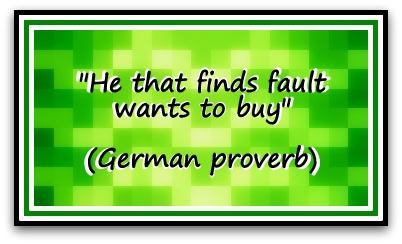Coaching Quote of the Day 20th April 2014

“He that finds fault wants to buy”
(German proverb)

“He that finds fault wants to buy”
(German proverb)

“I am a feather for each wind that blows.”
(Shakespeare)
In today’s guest post Executive Coach Suzi McAlpine shares some of her experience and knowledge.
By Suzi McAlpine

When I was studying to become an Executive Coach, one of the first things we were taught was the value of listening.
We learnt that being fully present and practicing deep, active listening with our clients, is one of the fundamental pillars of effective coaching – and leadership for that matter.
Yeah yeah, I hear you say. We already know this! What’s so profound about that?
Well, here’s the thing. It was only recently that I really, truly, completely got this concept. I’m talkin’ from the core of my being, totally understanding what a powerful tool that listening to our client and giving them our full attention can be.
Don’t get me wrong, I have always been a big advocate of the ‘shut up and listen’ approach.
But there’s a monumental difference between conversational listening (the type of listening which happens at least 80% of the time) and listening with full intent.
Let me explain.
Over the course of several months, I noticed I was using the ‘guiding gateway’ a lot more in coaching sessions with my clients.
This coincided with a growing sense of compulsion and pressure on myself to ‘perform’ as a coach.
I adopted a responsibility to engender transformational change in others. Their imminent success (or failure) rested upon my shoulders. It felt as if their development and performance was up to me.
Of course, this isn’t the job of a coach, right? So eventually, the weight of my false expectations started to backfire. Something had to give.
I began to leave sessions feeling frustrated when ‘progress’ wasn’t happening.
Increasingly, my clients would not end up doing what they had committed to do.
It was at this point I started to see the wisdom in the ol’ saying, “ if you keep doing the same things over and over, expect to get the same result.”
So I tried an experiment.
For one week, I would refrain from offering any input in terms of ways forward or suggestions regarding actions with my clients at all.
Instead I would only listen, paraphrase, listen some more, ask questions, provide meaning and context and offer encouragement and support if they needed it.
I would also take hardly any notes in the session, if at all.
My focus would be to give exquisite attention to what they were saying, how they were saying it, the language they used, their body language, facial expressions, their intonation, and to keep an eye out for any ‘loaded’ words. Even (and especially) what they were not saying.
Talk about epiphany city. It was so powerful to see the difference and improvement in the coaching sessions – for everyone.
1. I noticed for the first time that one client’s accent got stronger every time he was upset or angry, even though I had been coaching him for six months! This led to some breakthroughs about himself and his childhood experiences which were still playing out in a work environment.
2. I rediscovered the value of metaphor in providing people with understanding and a new perspective to their situation.
3. I ‘caught’ stuff I had been missing. Like emotions hiding just behind the surface but noticeable in the slightest of facial expressions or twist in body posture. These were often the keys to unlocking change.
4. My clients had so many more of those “aha” moments. They seemed to have better outcomes and experiences within the sessions. They left feeling empowered – that they had discovered their own solutions in moving forward as leaders.
5. My own enjoyment of the sessions improved dramatically. Listening is a gift for the coach as much as it is for the client. I felt revitalised in my work.
6. Ironically, I received more positive feedback about the sessions than I had ever done (not that this mattered to me).
So, I challenge you, particularly if you are an experienced coach, to mindfully re-engage with the value of the simple gift of listening.
Experiment with it in your coaching practice. Bring it once again to the forefront. Remember its importance in the leadership realm.
And, if you find yourself (like me) slipping into ‘fix-it’ mode, remember this –
“The greatest gift you can give another is the purity of your attention.”
– Richard Moss
 Suzi McAlpine is a leadership coach with over 15 years of experience in working alongside CEOs and senior leaders to harness their full potential – and achieve maximum results.
Suzi McAlpine is a leadership coach with over 15 years of experience in working alongside CEOs and senior leaders to harness their full potential – and achieve maximum results.
Suzi works with executives from a broad spectrum of organisations throughout New Zealand and is the author of an award-winning leadership blog, The Leader’s Digest.
Go to www.theleadersdigest.me to read Suzi’s free leadership tips and insights.
Twitter: @suzimcalpine
Facebook: www.facebook.com/McAlpineCoaching
LinkedIn: nz.linkedin.com/in/suzimcalpine/
Website: www.mcalpinecoaching.co.nz
Blog: www.theleadersdigest.me

“A smile is a curve that sets everything straight.”
(Phyllis Diller)

Each Monday I share the most RT’d quote(s) from the blogs twitter account over the previous week.
Last week the most RT’d tweet was:
“If you don’t like something, change it. If you can’t change it, change your attitude. Don’t complain.”
(Maya Angelou)
Tweeted on 8th April
The next most RT quote was a tie between:
“What you do makes a difference, and you have to decide what kind of the difference you want to make.”
(Jane Goodall)
Tweeted on 7th April
and
“You never fail until you stop trying.”
(Albert Einstein)
Tweeted on 12th April

Many thanks to everyone who shared the quotes above and the other quotes from last week. I know that there are various aspects that can influence if a quote attracts your attention – if you saw the tweet, personal style, if it speaks to something happening in your life at that moment etc.

(For those of you as geeky as I am and wondering what tool I’m using to measure individual RT’s this week I’ve been playing with www.twitonomy.com)

“A society grows great when old men plant trees whose shade they know they shall never sit in.”
(Greek proverb)

“A loving heart is the truest wisdom.”
(Dickens)
This week’s TED Talk clip is: David Brooks: Should you live for your résumé … or your eulogy?
Clip length: 20 mins 57 secs
Prefer to watch on TED.com? In that case you’ll need to click here.